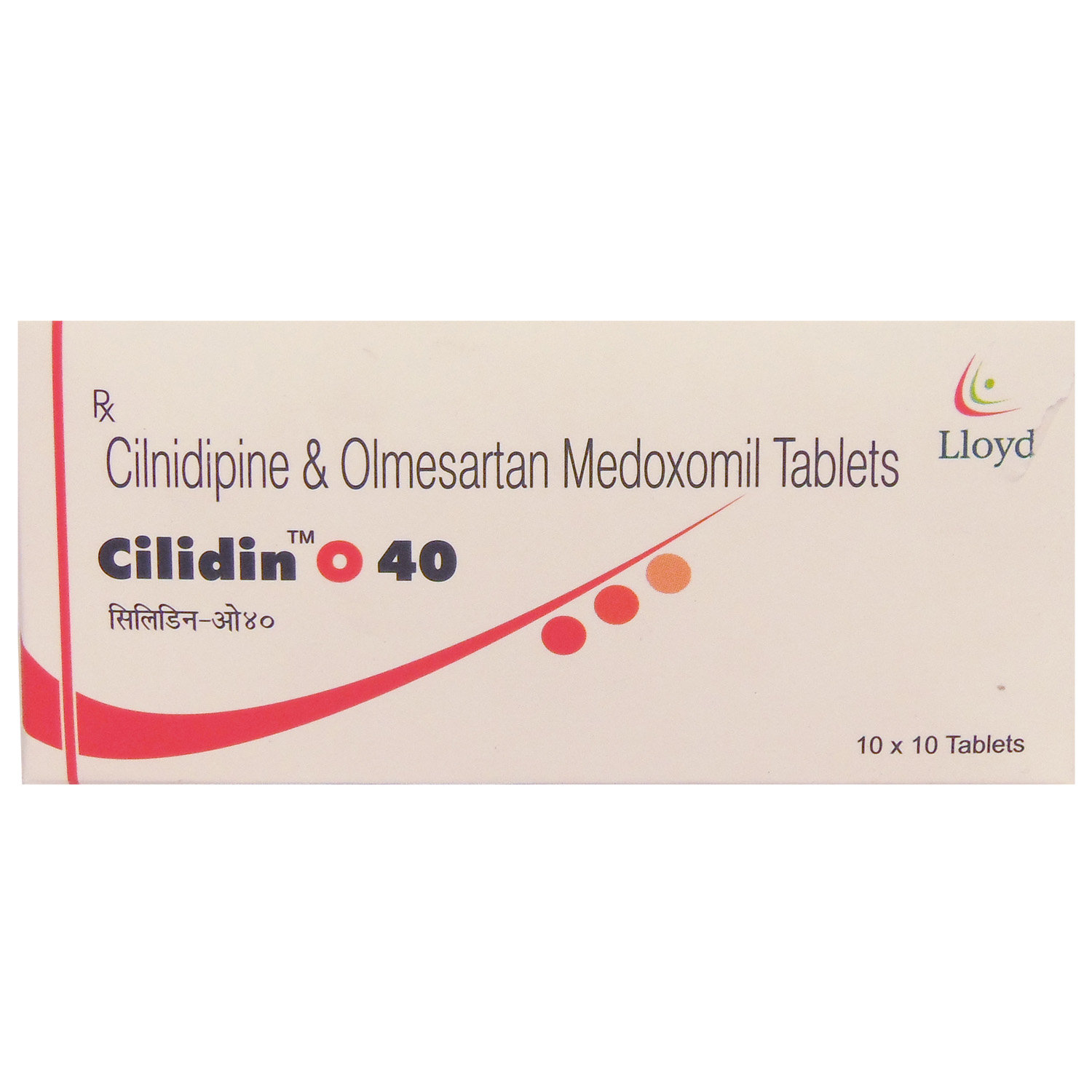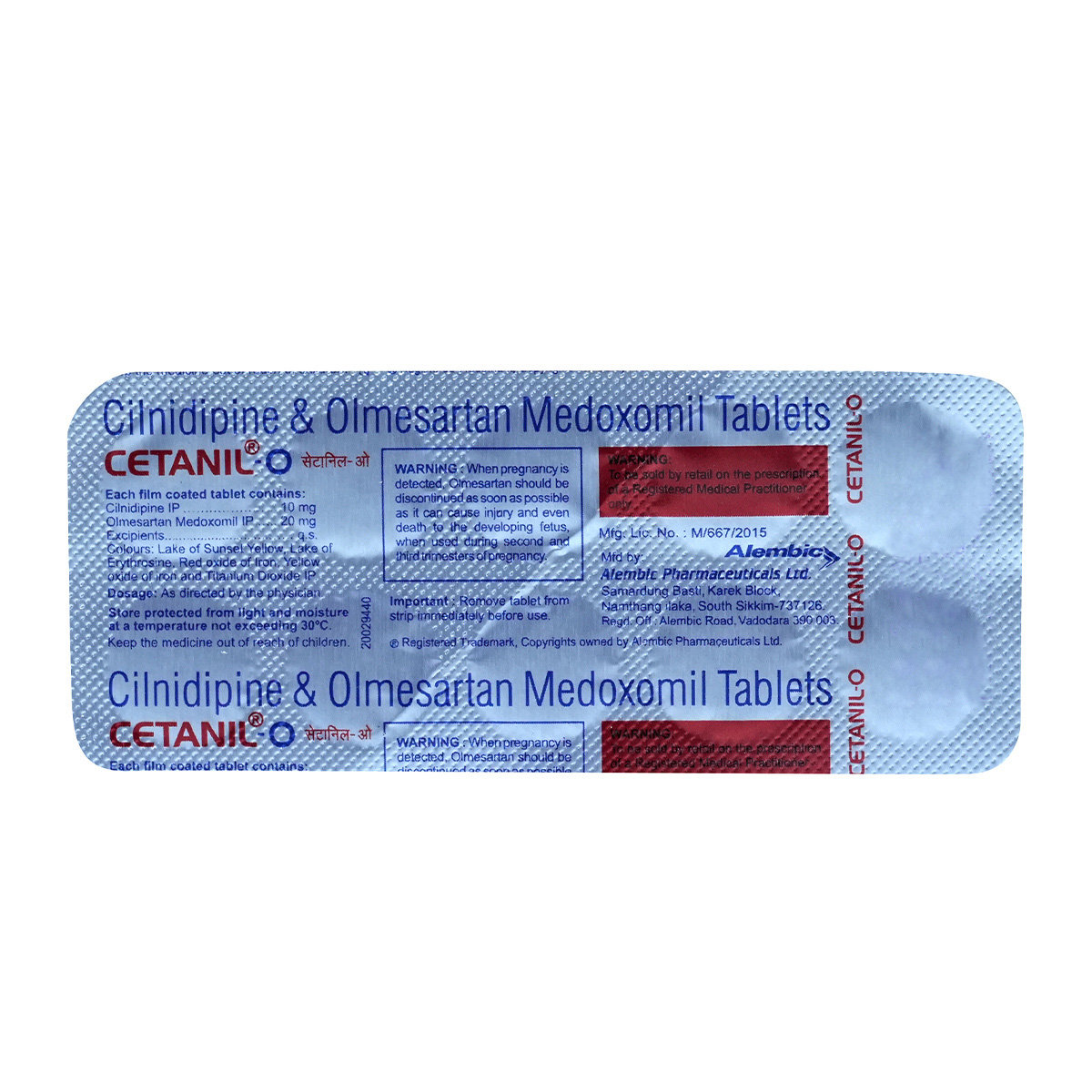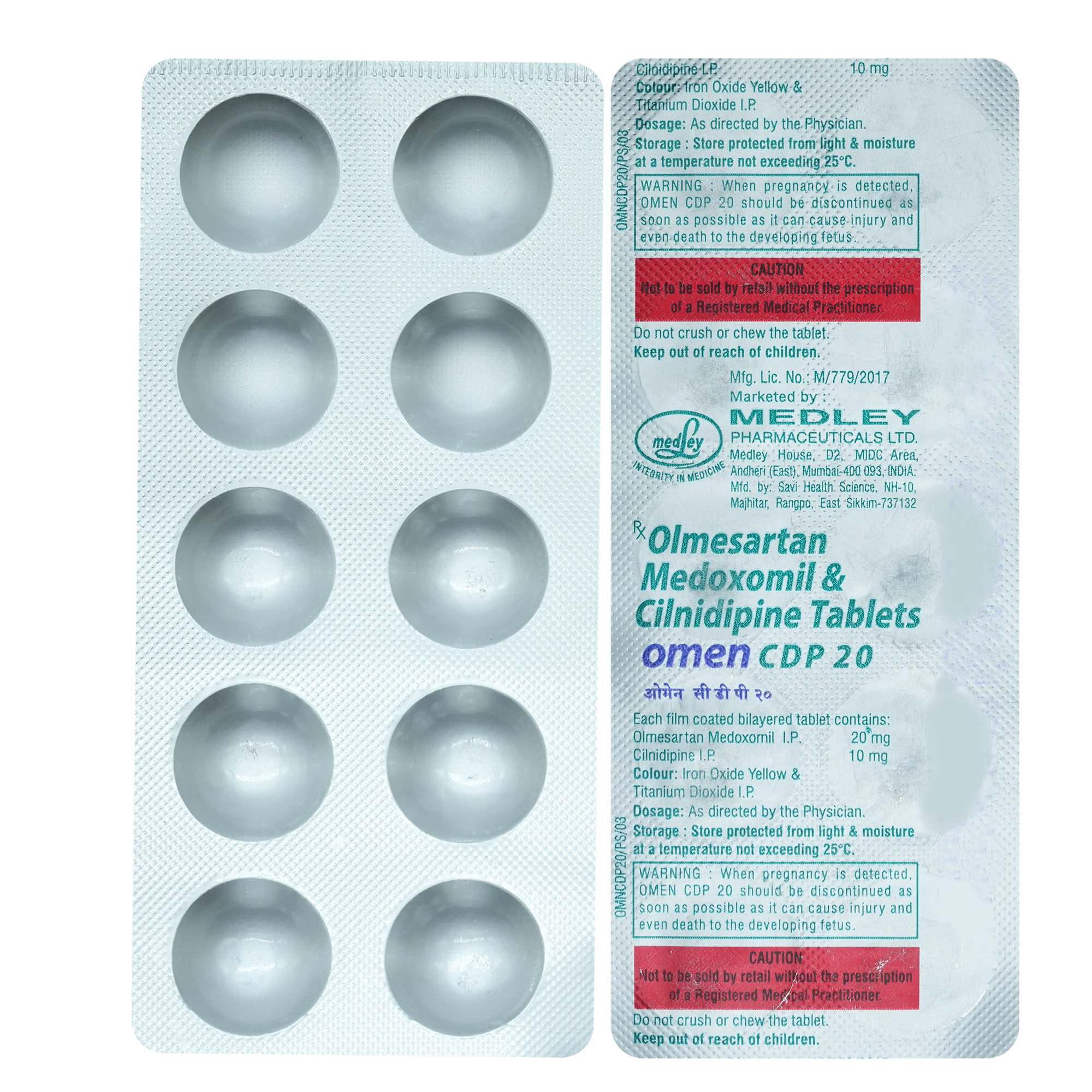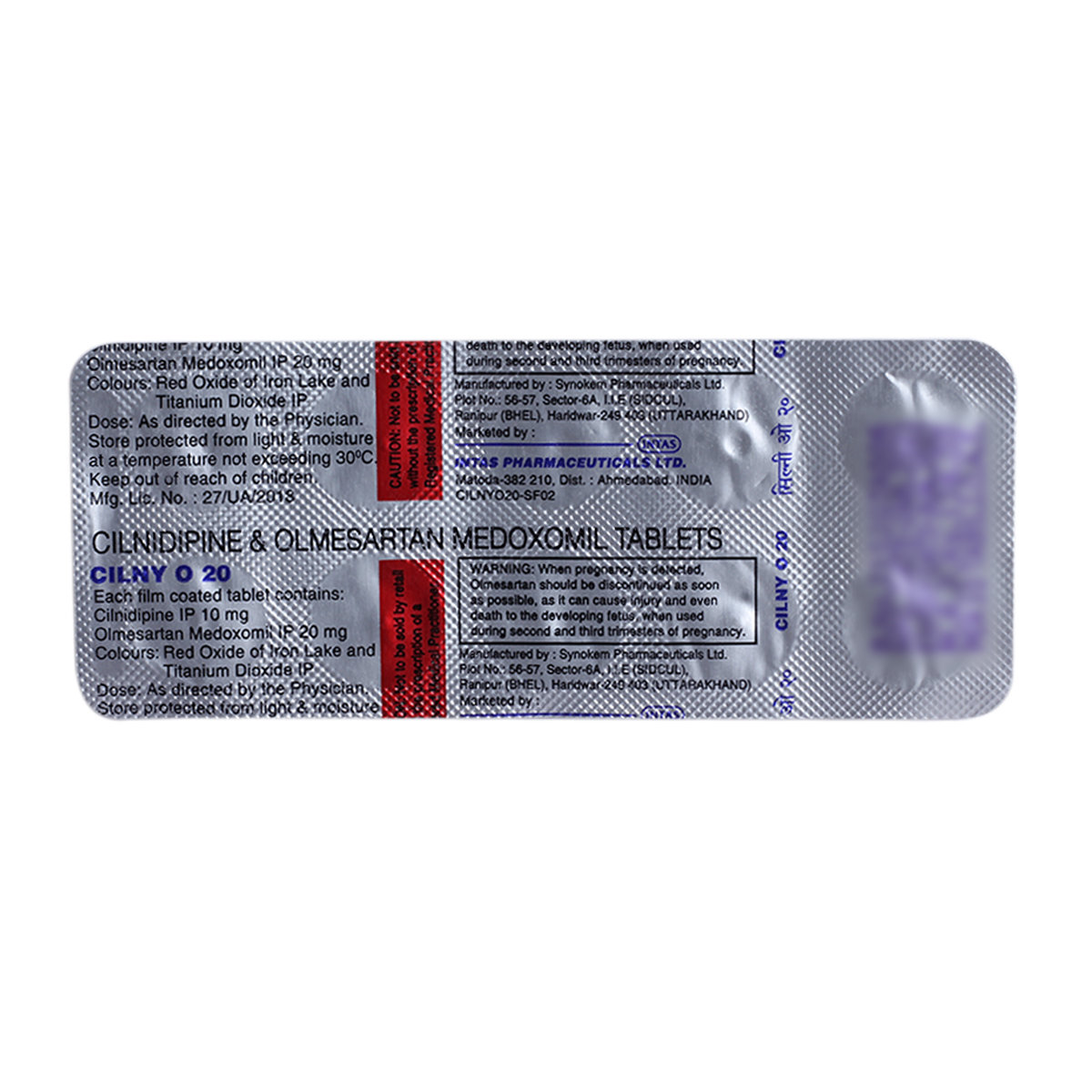Cilnidipine+olmesartan
About Cilnidipine+olmesartan
Cilnidipine+olmesartan belongs to the class of anti-hypertensives primarily taken for the treatment of hypertension (high blood pressure). It comprises Cilnidipine (calcium channel blocker) and olmesartan (angiotensin-II receptor antagonists). Hypertension is a lifelong or chronic condition in which the force exerted by the blood against the artery walls becomes so high that it leads to heart diseases.
Cilnidipine+olmesartan is a combination of two drugs, namely: cilnidipine and olmesartan, prescribed to treat hypertension. Cilnidipine works by blocking the activities of the calcium channels present in the blood vessels of the heart. As a result, the blood vessels widen and supply to the heart increases, lowering the elevated blood pressure and the workload placed on the heart. Olmesartan works by blocking the action of certain substances that are responsible for tightening the blood vessels. It allows the blood to flow more smoothly and makes the heart more efficient at pumping blood throughout the body. Thus, it reduces the chance of having any heart attack or stroke in the future.
You can take Cilnidipine+olmesartan with food or as directed by your doctor. It should be swallowed whole with a glass of water. Do not chew, bite, or break it. Your doctor will advise you on how often you take your tablets based on your medical condition. Common side effects of Cilnidipine+olmesartan include ankle swelling, dizziness, tiredness, palpitations, sleepiness, taste change, upset stomach. Most of these side effects of Cilnidipine+olmesartan do not require medical attention and gradually resolve over time. However, if the side effects are persistent, reach out to your doctor.
Don't stop taking $ name without your doctor's advice. Sudden Stopping Cilnidipine+olmesartan may cause changes in your heart rhythm and blood pressure, cause chest pain, or a heart attack. Your doctor will lower your dose gradually over a period of time to help prevent these symptoms. It is advised to drink plenty of fluids while taking this medicine to overcome dry mouth and extreme thirst. Patients suffering from kidney problems may be required to undergo regular blood creatinine, and potassium levels tests as Cilnidipine+olmesartan affects electrolytes level in our body, which can be monitored. Inform your doctor if you have throwing up, too much sweat, or loose stools as this may lead to low blood pressure.
Uses of Cilnidipine+olmesartan
Medicinal Benefits
Cilnidipine+olmesartan composed of Cilnidipine and olmesartan, prescribed to treat hypertension. Cilnidipine works by blocking the activities of the calcium channels present in the blood vessels of the heart. As a result, the blood vessels widen, and supply to the heart increases, lowering the elevated blood pressure and the workload placed on the heart. Due to its calcium channel blocking nature it may be also prescribed for relieving the heart’s workload caused due to the heart attack or stroke. Olmesartan works by blocking the action of certain substances that are responsible for tightening the blood vessels. It allows the blood to flow more smoothly and makes the heart more efficient at pumping blood throughout the body. Thus, it reduces the chance of having any heart attack or stroke in the future. Additionally, it has a protective effect on the kidney, and in the condition of diabetes.
Directions for Use
- Cilnidipine+olmesartan can be taken with or without food as advised by your doctor.
- Follow your doctor's instructions on the dosage and timing of this medication.
- Swallow Cilnidipine+olmesartan as a whole with a glass of water.
- Do not crush, break, or chew it.
Storage
Side Effects of Cilnidipine+olmesartan
- Ankle swelling
- Dizziness
- Palpitations
- Sleepiness
- Taste change
- Upset stomach
- Dry mouth
Drug Warnings
Cilnidipine+olmesartan should be taken with caution in patients with liver disease, kidney problems, heart failure, and problems with adrenal glands. You should monitor your blood pressure regularly to make sure the Cilnidipine+olmesartan is working efficiently. Besides this prolonged intake of Cilnidipine+olmesartan can lead to lowering of blood pressure (hypotension). So, daily monitoring of blood pressure is advisable. Speak to your doctor if you experience persistent diarrhea while on this medication. Inform your doctor about all your ongoing medications especially if you are taking medicines like Lithium, antacids, medicines used to relieve pain. Also, inform your doctor if you are more than 3 months pregnant.
Drug Interactions
Drug-Drug Interaction: Cilnidipine+olmesartan is known to interact with other antihypertensive medication, erythromycin (antibiotics), aspirin (pain medication), Benadryl (allergy medication), Carbamazepine (epilepsy medication), Xanax (medicine for anxiety disorder), and other antipsychotic drugs.
Drug-Food Interaction: Generally, no food interaction is found with this medicine. However, one should limit or avoid intake of alcoholic beverages.
Drug-Disease Interaction: Cilnidipine+olmesartan is contraindicated in patients with severe aortic stenosis (narrowed heart valve), cardiogenic shock (when suddenly the heart does not get enough blood supply), the recent history of unstable angina (chest pain), heart failure, renal/liver disease, angioedema(edema, or swelling, of the area below the skin or mucosa), and hypotension (low blood pressure).
Drug-Drug Interactions Checker List:
Safety Advice

Alcohol
unsafeCilnidipine+olmesartan can lower your blood pressure causing dizziness and drowsiness. It can also cause orthostatic hypotension (sudden fall in blood pressure while standing). So try to avoid intake of Cilnidipine+olmesartan with alcoholic beverages.

Pregnancy
cautionAvoid taking Cilnidipine+olmesartan if you are more than 3 months pregnant. Talk to your doctor for more information regarding this.

Breast Feeding
cautionThe nursing mother should consult a doctor before taking Cilnidipine+olmesartan.

Driving
unsafeCilnidipine+olmesartan may cause side effects that could affect your ability to drive. Taking Cilnidipine+olmesartan may lower your blood pressure

Liver
cautionThere is limited information available on the use of Cilnidipine+olmesartan in patients with liver disease. So Cilnidipine+olmesartan should be taken with caution and with a consultation to the doctor only.

Kidney
cautionDose adjustment may be needed. Consult your doctor before taking Cilnidipine+olmesartan if you have kidney impairment or any concerns regarding this.

Children
cautionCilnidipine+olmesartan can be given to children aged above 6 years if prescribed by a child specialist.
Habit Forming
Diet & Lifestyle Advise
- Keep your weight under control with BMI of 19.5-24.9.
- Do regular physical activity or exercise for at least 150 minutes per week, or about 30 minutes most days of the week. Doing this can help you to lower your raised blood pressure by about 5 mm of Hg.
- Opt for a diet rich in whole grains, fruits, veggies and low-fat dairy products.
- Limit intake of sodium chloride (table salt) in your daily diet to 2300 mg per day or less than 1500 mg is ideal for most adults.
- If you are taking alcohol then only one serving for women and two servings for men is advisable.
- Quitting smoking is the best strategy to lower the risk of heart disease.
- Avoid chronic stress as it can raise your blood pressure. Try to enjoy and spent time with your loved ones to cope with stress and practice mindfulness techniques.
- Monitor your blood pressure daily and if there is too much fluctuation then immediately contact your doctor.
- Try to include heart healthy omega 3 fatty acid containing food drinks in your daily diet. You can also use low-fat cooking oil like olive oil, soybean oil, canola oil, and coconut oil can help in lowering your elevated blood pressure.
Special Advise
Sudden withdrawal may exacerbate angina (chest pain) consult your doctor immediately.
Patients Concern
Disease/Condition Glossary
Hypertension is a chronic condition when blood pressure is too high. This condition can lead to hardened arteries (blood vessels), decreasing the blood and oxygen flow to the heart. Raised blood pressure can cause chest pain (angina) and heart attack (when blood supply to the heart is blocked). Additionally, high blood pressure also causes brain damage (stroke) and kidney failure. High blood pressure can be diagnosed with the help of a blood pressure monitor or sphygmomanometer. Systolic pressure is the pressure when the heart pumps blood out. On the other hand, diastolic pressure is the pressure when your heart is at the resting stage between heartbeats. If your blood pressure is 140/90 mm of Hg, it means the systolic pressure is 140 mm of Hg and, diastolic pressure is 90 mm of Hg. Ideal blood pressure should be between 90/60 mm of Hg and 120/80 mm of Hg.
FAQs
Cilnidipine+olmesartan is used to treat hypertension (high blood pressure).
It is advised to continue your medicine even after your blood pressure is under control or becomes normal as blood pressure can shoot up any time. If you have persistent headache, please consult your doctor immediately.
If you miss a dose of Cilnidipine+olmesartan, you are advised to take it as soon as you remember. Do not double the dose as it may lead to lowering of blood pressure.
High blood pressure in pregnancy may cause eclampsia that can be harmful to both baby and mother. So, during the pregnancy, you should have regular blood pressure monitoring.
No, it is a prescribed drug, given by a physician for preventing specific medical conditions. Taking it on your own can cause unwanted side-effects.
Yes, Cilnidipine+olmesartan can cause dizziness. It is advised to avoid driving or operate any heavy machinery while taking Cilnidipine+olmesartan. In case you feel dizzy or lightheaded, it is advised to rest for some time until you feel better.
Cilnidipine+olmesartan contains Cilnidipine (calcium channel blocker) and olmesartan (angiotensin-II receptor antagonists), prescribed to treat hypertension. Cilnidipine works by blocking the activities of the calcium channels present in the blood vessels of the heart. As a result, the blood vessels widen, and supply to the heart increases, lowering the elevated blood pressure and the workload placed on the heart. Olmesartan works by blocking the action of certain substances that are responsible for tightening the blood vessels. It allows the blood to flow more smoothly and makes the heart more efficient at pumping blood throughout the body.
Take Cilnidipine+olmesartan as directed by your doctor. It is usually taken with food to help it absorb slowly and reduce the risk of a sudden drop in blood pressure. Swallow the medication whole with a glass of water. Do not crush, chew, or break it.
Cilnidipine+olmesartan usually starts showing effects within a few hours of taking the medication. Your blood pressure may decrease within the first week of treatment, but it may take up to 2 weeks to notice the full benefits of Cilnidipine+olmesartan. Please follow the dosage and duration prescribed by your doctor to achieve the best results.
The best time to take Cilnidipine+olmesartan is usually in the morning, with or without food. It is important to take Cilnidipine+olmesartan at the same time each day to help you remember and maintain consistent blood pressure control. However, please follow your doctor's instructions regarding the timing, especially if you have any specific health conditions.
While using Cilnidipine+olmesartan, it is important to keep your weight in check, aiming for a BMI between 19.5 and 24.9. Try to get at least 150 minutes of physical activity each week and follow a balanced diet that includes whole grains, fruits, vegetables, and low-fat dairy. Limit your sodium intake to no more than 2,300 mg per day (ideally less than 1,500 mg for most adults), and drink alcohol in moderation (one serving per day for women and two for men). Quitting smoking, managing stress with relaxation techniques or mindfulness, and spending time with loved ones can help prevent spikes in blood pressure. Monitor your blood pressure daily, and if you notice any changes, contact your doctor immediately. Including heart-healthy omega-3 fatty acids in your diet and using low-fat cooking oils like olive, soybean, canola, or coconut oil can further help manage your blood pressure.
Cilnidipine+olmesartan does not cause weight gain. However, it contains olmesartan, which may lead to mild weight changes. If you notice significant weight gain, please consult your doctor, as it could be related to an underlying condition or another factor.
The common side effects of Cilnidipine+olmesartan include ankle swelling, dizziness, tiredness, palpitations, sleepiness, taste change, and upset stomach. Most of these side effects of Cilnidipine+olmesartan do not require medical attention and gradually resolve over time. However, if the side effects persist or worsen, please reach out to your doctor.
There is no strong evidence suggesting that Cilnidipine+olmesartan directly affects fertility or sexual function. If you have concerns about how Cilnidipine+olmesartan might impact your fertility or sex life, please consult your doctor.
Cilnidipine+olmesartan is usually prescribed for long-term use to manage high blood pressure (hypertension). The duration of treatment depends on your condition and how well your blood pressure is controlled. It is generally safe to take Cilnidipine+olmesartan long-term when prescribed by a doctor, but regular monitoring of your blood pressure is recommended.









